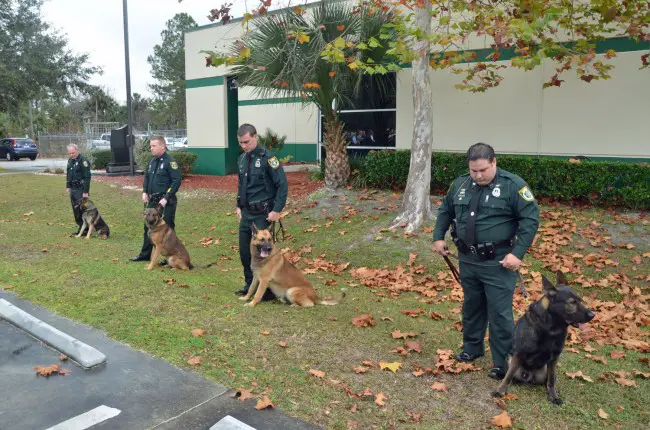
Franky the police dog was barking up the right tree, but the fruit should have been off limits.
A Miami police dog’s signal about marijuana being present in a home was dead on – the house was full of pot – but letting the dog sniff around the house before police got a warrant violated the homeowner’s rights, the U.S. Supreme Court narrowly ruled Tuesday.
The Supreme Court’s 5-4 ruling in Florida v. Jardines is the second out of the state dealing with how search and seizure limits under the U.S. Constitution affect the ability of police to use sniffer dogs to find drugs.
The court upheld a 2011 ruling by the Florida Supreme Court, which threw out the seized evidence, saying that a mere sniff of a dog at someone’s door is a “substantial government intrusion into the sanctity of the home and constitutes a ‘search’ within the meaning of the Fourth Amendment.”
That means, the Florida court said – and the nation’s high court agreed on Tuesday – that police should have gotten a warrant before even going up on the porch with the dog. Instead, police used the dog’s alert to confirm their suspicion, based on a tip, that the home was a grow house, and then got a warrant afterward, based in part on the alert. A later search turned up 25 pounds of pot.
While police are free to walk up the door and knock, just like anyone else, using a dog to sniff for drugs goes beyond the implied invitation that’s open for anyone, wrote Justice Antonin Scalia for the majority.
“Introducing a trained police dog to explore the area around the home in hopes of discovering incriminating evidence is something else,” Scalia wrote. “There is no customary invitation to do that.”
And the home is different from other places, where police might be justified in gathering evidence, Scalia said.
At the core of the Fourth Amendment, protecting against illegal search and seizure, is “the right of a man to retreat into his own home and there be free from unreasonable governmental intrusion,” Scalia wrote. “This right would be of little practical value if the State’s agents could stand in a home’s porch or side garden and trawl for evidence with impunity; the right to retreat would be significantly diminished if the police could enter a man’s property to observe his repose from just outside the front window.”
Florida, represented by Attorney General Pam Bondi, had appealed the Florida Supreme Court’s ruling.
The information police gave to a magistrate seeking a warrant for the house, based the request in part on Franky the chocolate lab’s alert at the house’s front door. After getting the warrant, police returned and found the marijuana and arrested the resident, Joelis Jardines, as he tried to flee. Jardines argued that the use of Franky first on the porch was itself a “search,” and police should have had a warrant before he ever started sniffing around.
In a dissent, Justice Samuel Alito agreed with Jardines, saying police, like anyone else, are free to walk up the walkway to the front of someone’s house, and are free to do so with a dog, without being considered trespassing. He also noted that the officer and the dog weren’t doing anything extraordinary, and that it only took a moment for Franky to alert on the smell.
“The conduct of the police officer in this case did not constitute a trespass and did not violate respondent’s reasonable expectations of privacy,” Alito wrote. “I would hold that this conduct was not a search.”
The Supreme Court’s ruling against a drug dog Tuesday was in contrast to another recent Florida case in which the nation’s high court allowed evidence of a drug dog’s sniffing of a truck. In that case, the U.S. Supreme Court said that police had probable cause to search a truck despite questions about whether the prosecution had established the reliability of the drug dog’s nose. That case, Florida v. Harris, was decided last month.
–David Royse, News Service of Florida
![]()
Florida v. Jardines, Drug-Sniffing Dog Case





























notasenior says
Finally, Antonin gives us a good decision!
Samuel Smith says
Very good.
Deep South says
How does this ruling differ from using drug sniffing dogs at airports or vehicles that are pulled over ?
johnny taxpayer says
Because you have an expectation of privacy in your home that you dont have on the highway or at the airport.
Deep South says
Isn’t my vehicle, my luggage, my self, my property, and invasion of my privacy ? Please be more
specific ??
christina b says
Because you have a reasonable expectation of privacy in your own home. You do not have the same when you go out on the streets (or pulled over already) or on federal or state property.
I am so glad to see this decision–little by little, we need to chip away at these stupid laws governing “reefer madness”–not to mention preserve our privacy where we live. It’s about time.